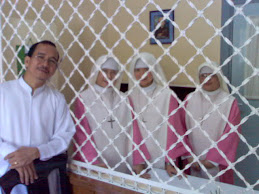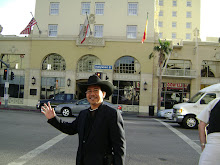
I remember we were taught that when someone living in places where snow abounds (and I've seen how the place can be literally painted white when snow falls) sees a green leaf, the feeling of hope is awakened. Soon, the cold of the snow will be gone when the green shoots start to come. Green really stands for life, the cycle of life.


The Word of God is His Word spoken for life. It comes out from His heart out of love. And it goes, fulfilling its mission, and then coming back to God. Such is the cycle of the Word of God: from God to give life and returning back to God, the cycle of life.
And the Word today is "sown," literally and figuratively. Literally because it is announced, spoken, for all to hear. He talks to us, but do we really stop and listen? What is sown has life, to nurture life, so it will live in God. One notices that between two people who know and care for each other, talking is their sign of caring for the other. Children who grew up in environments where they were rarely talked to likewise rarely talks, and develops their speech abilities only when someone who cares for them starts talking to them. When the talking stops between two people, or when there is no talking between two people, the care becomes unclear, the gap becomes evident, and the distance makes them cold to each other. But God "sows" His Word. He reaches out to us, so we can live in Him.
The question then is the kind of listening we give, which in Scriptures today identifies as "the soil" or "the kind of ground" on which the seed is sown. Let me divide, using the Scriptures themselves, these kinds into four:
1. Listening with disinterest - an action done by someone who seems to simply pass by, the sound is heard in one ear, it goes away in the other ear, doesn't even settle in the mind, and is rarely given meaning. It doesn't resonate anything inside the person. It dies and withers, taken away, so to say. Is it a matter of inability to listen? Is it a case of disability to listen? In any case, what is sown is not able to live in the soil. They say, "beauty is in the eye of the beholder." Does this mean that meaning is in the ears of the hearer? But the ears here definitely involve the mind and the heart, just as the eye in there involves both faculties of the mind and the heart.
2. Superficial interest - What is heard is given some moments of focus and interest, but unable to grapple with its meaning, what is sown dies. Just like the lessons learned in school, unless it is written for students to re-view (view again), short term memory of the lessons fades and dissipates into thin air. Again, what is sown dies.
3. Cluttered interest - there may be interest and meaning given to what is heard, what is sown in us. But this interest competes with other interests, the "weeds and thorns" alluded to in the parable, Our ability to give meaning to what is heard becomes colored by the environment that surrounds the input. When what is heard is simply allowed to grow, nurtured less, it rarely really grows. It becomes clobbered by the other interests given co-equal importance. Oftentimes in life, what is given importance is the immediate. If only we realize the art of prioritizing. I say "art" because it involves giving time for it, just like an artist gives time in what one is painting, or a composer's attention given to the music being composed. All other things come secondary, of less importance. Of course, in time, what was sown dies. Would that its life potency were so strong as to wiggle itself in great struggle to seek the focus it deserves. But rarely does it survive.
4. Real interest - the seed sown on this type of soil is given the focus it deserves, finds resonance in the person listening to what was spoken. Meaning is enkindled, and the relationship blooms. What is learned becomes part of life. Indeed, the seed bears fruit as much as it has been given due credit and attention.
Now I understand even more fully why SILENCE was required during my Novitiate Days way back 1983, and required in religious life. Because "seeds" really grow in the silence of the earth. It can only be as loud as the attention given it. It is only after "overlearning" my lessons did I manage to really remember, not just for exams, but for life.
The story of the dogs that saw the thief illustrates very well a good summary for these thoughts. One night, I woke up hearing the dogs of the neighborhood barking. I opened my windows and saw a man carrying a rooster it stole running hurriedly as dogs were at his back chasing him with their barking. Soon other dogs joined the fray, barked along. After a few minutes I saw some dogs return while I could still hear other dogs barking as they chased the thief. Soon the thief was caught. Only the dogs that saw the thief pursued the thief. Those who barked along stopped, exhausted, and returned.
The thief can give meaning to the dogs barking. The Word of God can continuously provide the meaning that can sustain its life in the right soil. If only we allow it to grow in us, giving it the nurturance it deserves, so it can give us life.
God bless and take care






